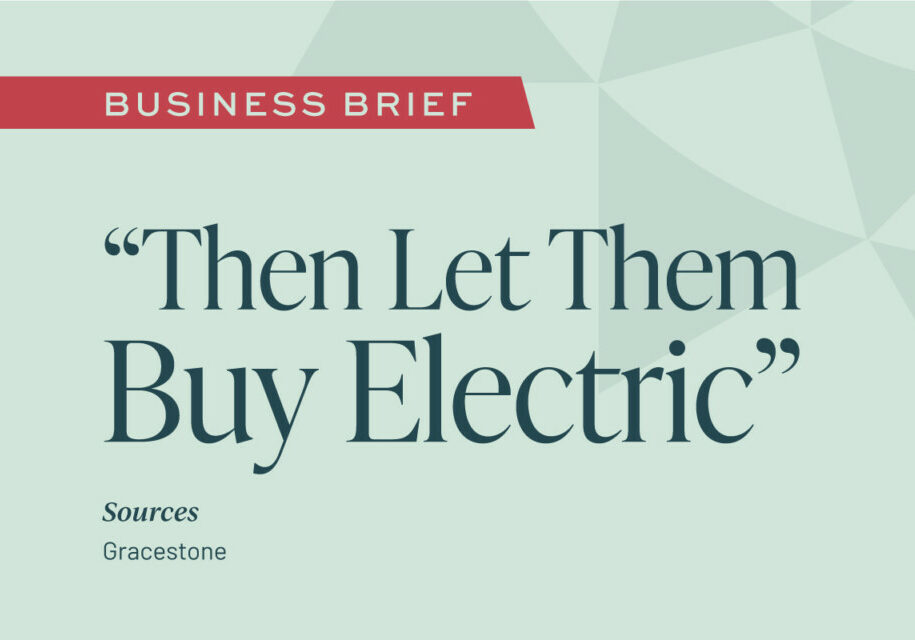
Soaring inflation and gasoline prices have everyone on edge. Unlike the princess, we
understand.
An insightful client recently told us: “I watch oil and gas prices because they affect
everybody. It doesn’t matter if you drive a car or a boat or a plane – they all need gas.”
Here are three quick thoughts on our current favorite subject: rising gas prices.
1. “Then let them buy electric.”1
On numerous occasions, the presidential administration has touted electric vehicles as
a solution to rising gas prices. Families who buy electric vehicles “never have to worry
about gas prices again.” 2
Simple facts tell a different story. Higher sticker prices, increased insurance premiums
and elevated repair costs make EV ownership far beyond the reach of most Americans. 3 Widespread EV ownership is a laudable long-term goal but is not a solution to our current predicament.
In addition, all energy sources have pros and cons. The administration is opposed to
fossil fuels generally (coal) and nuclear energy … which constitute almost 40% of the
energy sources used for electrical generation in the country.
2. “Chaos is a ladder.”
Two years ago, the country was energy independent. 4 Currently, domestic oil
companies are producing almost one million barrels a day less than they did in 2019.
Supply has decreased; demand exceeds pre-pandemic levels.
The administration’s hostile attitude toward domestic oil companies has proven
counterproductive. Campaign rhetoric promising to transition and ultimately “end” the oil industry 5 quickly escalated into policy changes detrimental to the country’s oil supply. 6 Capital expenditures designed to boost production require a measure of political support and certainty; domestic oil companies have neither.
3. Help is on the way … her name is September.
There are a number of realistic measures that would increase domestic supply, lower
gas prices and move the country back to energy independence.
In broad strokes, these include ratcheting down the rhetoric, improving the regulatory
environment and prioritizing domestic production over imports (think more West Texas, less Saudi Arabia).
More specifically, streamlining the review and permitting process for new critical energy infrastructure projects, accelerating the approval of projects and dismantling new climate disclosure proposal would be a good start. 7
In addition, retail gas prices tend to rise in the spring and peak in late summer. 8
Gasoline specifications and formulations also change in the summer, making summer
retail gas more expensive. 9
We are nearly halfway through the summer season. Help is on the way … her name is
September.
Footnotes
- When told the peasants had no bread, the princess responded: “Then let them eat cake.” She was a little out of touch with her subjects.
- Secretary of Transportation Pete Buttigieg, The Sunday Show with Jonathan
Capehart, MSBNC, November 28, 2021; Hearing before the House Appropriations
Committee, May 9, 2022. - The Real Costs of Electric Car Ownership, CNET, May 7, 2022.
- The U.S. was a net total energy exporter in 2019 and 2020. U.S. Energy Information Administration.
- Candidate Biden: “No ability for the oil industry to continue to drill, period, ends, number one.” Democratic presidential primary debate, March 15, 2020; See also letter from Pres. Biden to the Federal Trade Commission dated November 17, 2021 accusing domestic oil producers of “anti-competitive or otherwise potentially illegal conduct” and letter to domestic oil companies dated June 14, 2022 blaming gas prices on “Vladimir Putin’s Price Hike.”
- Cancellation of cross border permits for the Keystone XL Pipeline cost the country nearly 900,000 barrels a day of crude oil, enough to offset the volumes of crude oil previously entering the U.S. from Russia. Why Biden’s Killing of Keystone XL Was an Energy Security Blunder, Forbes, March 10, 2020.
- See letter from the American Petroleum Institution to President Biden, June 14, 2022.
- U.S. Energy Information Administration.
- Id.